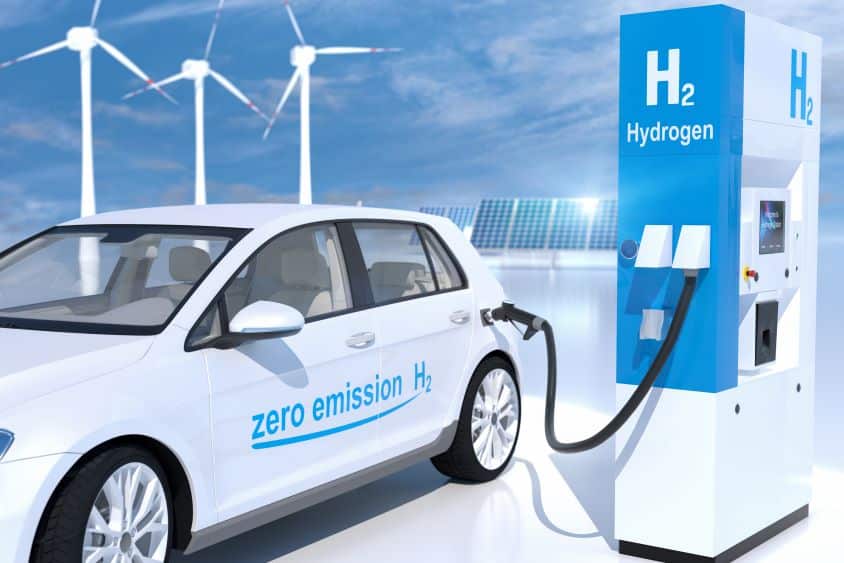Hydrogen vehicles: a rival for EVs?
Written by: Simon Pavey, Last updated:13th February 2023

As we collectively tackle the climate crisis, there is a real need for our transportation to reach higher standards of sustainability. The electric car has been growing both in popularity and accessibility in the last decade, and June of 2022 saw a 14% year-on-year increase in EV registrations. But is there any other sustainable means of getting from A to B?
Hydrogen vehicles have been cause for heated discussion in recent years, with the developing technology opening up possibilities and qualms. In this blog, we’ll take a look at how hydrogen vehicles work, how much traction they are gaining, and in what areas.
How do hydrogen cars work?
Hydrogen vehicles produce electricity by powering a fuel cell with hydrogen. What this means is a chemical reaction fuels the vehicle: hydrogen moves from the tank into the fuel cell, where it mixes with oxygen, creating H2O and generating the electricity that powers the vehicle’s motor.
Refilling a hydrogen vehicle looks much the same as refilling a combustion engine vehicle. You would attach the refuelling pipe to the vehicle and wait for it to fill up, which happens in as little as a few minutes (for hydrogen cars) giving it an edge of convenience over EVs.
How many hydrogen vehicles are on the roads?
Using hydrogen as an energy carrier is not a new idea, but the use of fuel cells for vehicles is something that has seen an acceleration in recent years. Because hydrogen vehicles are still relatively new, there are only around 60,000 of them in motion today and of that number only 300 are on UK roads.
Why aren’t there more hydrogen vehicles?
Technology for hydrogen fuel cells has been developing slowly over the years, particularly in comparison to electric vehicle batteries. The immediate reason for this is that hydrogen vehicles are more complex than their electric ‘rivals’, relying not only on the development of more practical technology but also on the introduction of infrastructure to support their use.
Unfortunately, despite offering similar sustainable qualities as electric vehicles and more mileage too, hydrogen cars and vehicles are currently quite impractical for mass adoption. Some of the limitations that hydrogen vehicles suffer from currently include:
- Hydrogen is highly flammable – improper handling could cause serious accidents.
- High pressure handling – compressing the gas is difficult and increases the risk of accident if handled incorrectly.
- Staying renewable is expensive – the more affordable ways of producing hydrogen currently rely on large quantities of fossil fuels.
- They are costly to build – they are yet to be as accessibly priced as EVs are becoming.
Nonetheless, if more progress is made in the coming years, we may see the limitations of hydrogen cars lessen as more cost and energy efficient ways of producing the vehicles become available. As this happens, the introduction of hydrogen refuelling infrastructure will also help make hydrogen vehicles a more viable option.
Heavy duty hydrogen vehicles
Whilst the use of hydrogen fuel cells for cars and similar passenger vehicles is not yet practical, hydrogen has been making waves in other areas. Hydrogen power has a high potential for HGVs and long-haul vehicles as a sustainable alternative. HGVs currently account for 18% of greenhouse gas emissions putting them at high priority for vehicles that need sustainable alternatives. Unfortunately, EVs are yet to reach the range that’s needed by long-haul vehicles, with most only capable of around 200-300 miles maximum.
You can read more about heavy duty electric vehicles here.
JCB hydrogen engine
Whilst the use of hydrogen fuel cells for cars and similar passenger vehicles is not yet practical, hydrogen has been making waves in other areas. In the last few years, there have been a number of firsts for hydrogen powered plant machinery on construction sites. JCB announced the development of the first hydrogen powered excavator back in 2020 as part of their efforts to meet NetZero 2050.
Fuel Card Service EV Hub
Hydrogen shows real potential as an eco-conscious alternative to combustion engines for HGVs, but for most the move to EVs is a more accessible option. We are growing our EV hub, to offer a selection of EV charge cards, information on charge point locations, as well as a range of insights into the development of electric vehicles of all sizes.
If you’d like to learn more about the services and fuel cards we offer, get in touch with our team today.
back


